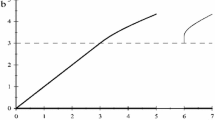Abstract.
Most of the literature on auctions with endogenous entry assumes that, in equilibrium, the number of entrants is deterministic. We discuss a series of experiments designed to test the alternative hypothesis that, even in equilibrium, the number of entrants is stochastic. This distinction has strong implications for auction performance, the design of optimal mechanisms, and social welfare. Our results strongly reject the hypothesis of deterministic entry and tend to confirm the alternative hypothesis that entry is stochastic.
Similar content being viewed by others
Author information
Authors and Affiliations
Additional information
Revised February 2000
Rights and permissions
About this article
Cite this article
Smith, J., Levin, D. Entry coordination in auctions and social welfare: An experimental investigation. Game Theory 30, 321–350 (2002). https://doi.org/10.1007/s001820100083
Issue Date:
DOI: https://doi.org/10.1007/s001820100083




